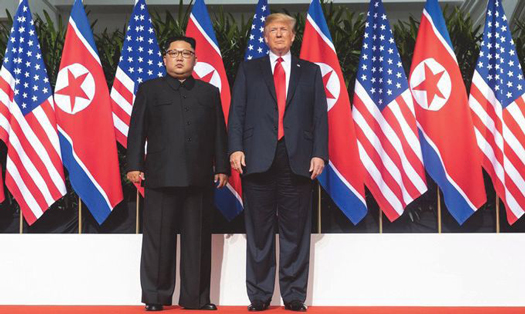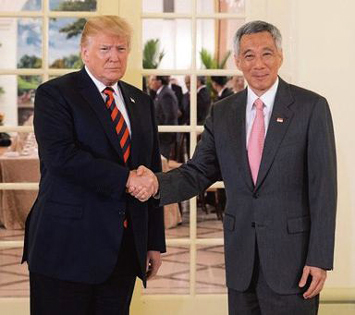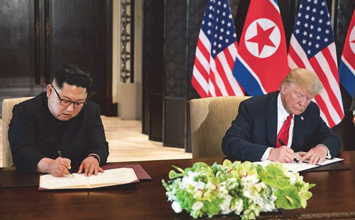Safety and uncertainty rise on Korean Peninsula after summit
By Askia Muhammad -Senior Editor- | Last updated: Jun 20, 2018 - 2:47:50 PMWhat's your opinion on this article?

President Donald J. Trump and Chairman Kim Jong Un of the State Affairs Commission of the Democratic People’s Republic of Korea, stand onstage after meeting for the first time June 12 at the Capella Hotel in Singapore.
|
WASHINGTON—President Donald J. Trump was expecting accolades, a hero’s welcome, a Nobel Peace Prize even, for his historic summit in Singapore with the Democratic People’s Republic of Korea’s Leader Kim Jong-un. Instead he got a lukewarm reception when he returned home June 14, as North Korean state media claimed a PR victory for its side.
In a series of tweets, Mr. Trump took political credit for the summit. He declared that North Korea no longer poses a nuclear threat following his meeting with Mr. Kim, even though it produced no verifiable proof that the government in Pyongyang will discontinue its nuclear program.
“Just landed - a long trip, but everybody can now feel much safer than the day I took office,” Mr. Trump tweeted as he arrived back in Washington June 13. “There is no longer a Nuclear Threat from North Korea.”
In a separate tweet, he said: “North Korea is ‘no longer’ the U.S.’s biggest and most dangerous problem,” telling Americans and the rest of the world they can “sleep well tonight!”
The two leaders signed a document in which Mr. Kim “reaffirmed his firm and unwavering commitment to complete denuclearization of the Korean Peninsula” and the U.S. agreed to “provide security guarantees.”
There was no mention of the previous U.S. demand for a “complete, verifiable and irreversible denuclearization” from Pyongyang. Mr. Kim’s commitments did not appear to go beyond what he already pledged to do in April when he met with South Korean President Moon Jae-in along the Demilitarized Zone (DMZ) dividing their two countries.
The summit marked the first meeting between a U.S. and North Korean leader in six decades of hostility and did mark a reduction in tensions from last fall, when Messrs. Trump and Kim were trading insults that raised the specter of war.
“Somebody Got Punked in Singapore, Lordy, believe before the sun go down in DC this To will be walked back,” Russell Honorė, a retired U.S. Army Lt. Gen. who formerly commanded U.S. troops along the DMZ, said via Twitter, and confirmed later in an interview.
But Mr. Trump believes his deal with Mr. Kim will save tens of millions of people from a potential nuclear war. The president believes he was doing what is necessary for peace. “I don’t want to see a nuclear weapon destroy you and your family,” Mr. Trump told reporters during an impromptu press gaggle outside the White House West Wing. He added: “If you’re fair, when I came in, people thought we were probably going to war with North Korea. … If we did, millions of people would have been killed,” Mr. Trump said.

President Donald J. Trump shakes hands with Prime Minister Lee Hsien Loong of Singapore June 11, after their bilateral meeting in the prime minister’s office at the Istana Palace in Singapore.
|
“What strikes me is the confluence of Trump’s interest and Kim Jong-un’s interest,” Dr. Clarence Lusane, chair of the Department of Political Science at Howard University, told The Final Call. “And that’s kind of what comes together, regardless of its impact on, North Korea, the United States, or the rest of the world.
“In that context, symbolism is critical. Images are critical. And, for North Korea, gaining legitimacy. It plays itself out, not on the merits of addressing seriously, the issue of denuclearization, but on the really narrow kind of personal interests of Kim and Trump. And because of that, you don’t get any real substantive agreement that generally takes years to put in place, but this sort of theatrical performance.” Dr. Lusane said.
“Today, we had a historic meeting and decided to leave the past behind,” Mr. Kim said in a joint news conference with Mr. Trump. “And we are about to sign a historic document. The world will see a major change. I would like to express my gratitude to President Trump to make this meeting happen. Thank you.”
“Thank you very much. Thank you very much. It’s fantastic. Thank you very much, everybody,” Mr. Trump gushed, even promising to invite Mr. Kim to visit him at the White House. “And we’re very proud of what took place today. I think our whole relationship with North Korea and the Korean Peninsula is—it’s going to be a very much different situation than it has in the past.
“We both want to do something. We both are going to do something. And we have developed a very special bond. So, people are going to be very impressed. People are going to be very happy. And we’re going to take care of a very big and very dangerous problem for the world. And I want to thank Chairman Kim. We spent a lot of time together today, very intensive time. And I would actually say that it worked out for both of us far better than anybody could have expected, I think far better,” said Mr. Trump.
Journalist Tim Shorrock grew up in Seoul, South Korea, and in Tokyo Japan. He reported on the summit for The Nationmagazine, and discussed it on “Democracy Now!”

President Donald J. Trump and Chairman Kim Jong Un of the State Affairs Commission of the Democratic People’s Republic of Korea, participate in a joint statement signing, June 12, at the Capella Hotel in Singapore.
|
“The most surprising thing I heard was when he said, you know, ‘We’re going to end the war games.’ And that had not been previously announced,” he continued. “Yesterday, here in Singapore, Secretary of State Mike Pompeo had said that the U.S. was ready to give, what he said, very unique guarantees, security guarantees, to North Korea. I think it’s clear what they meant was the ending of these war games, which may have even stunned South Korea, because I’m not clear exactly how much he consulted with President Moon Jae-in on this.
“That was one thing I was very surprised by. And I think that’s actually quite a stunning development,” Mr. Shorrock said. Mr. Trump defended the decision.
“We’ve done exercises for a long period of time, working with South Korea. And we call them war games, and I call them war games,” he told reporters after the summit. “And they’re tremendously expensive. The amount of money that we spend on that is incredible. And South Korea contributes, but not 100 percent, which is certainly a subject that we have to talk to them about also. And that has to do with the military expense and also the trade. So, we’re doing that. We actually have a new deal with South Korea in terms of the trade deal, but we have to talk to them. We have to talk to many countries about treating us fairly. But the war games are very expensive. We pay for a big majority of them,” said Mr. Trump.
“We gave something. We got nothing,” Gen. Honorė insisted. “We gave two things. We met with him, and we offered to stop our semi-annual exercises” of combined force: Army, Marines, Navy, Air Force, along with comparable forces from the South Korean Army. “We’ve got to train together. If we don’t train together, we will not be able to fight together, and that’s our biggest deterrent is our ability to bring our combat power.
“So the idea that we’re going to stop training is bullshit. You’ve got to train every day in Korea. I commanded the Special Infantry Division, and every day of the year with the exception of Christmas, we’ve got people in the field shooting, because you’ve got to qualify on your weapon every 90 days. If you don’t qualify, you’re not ready to fight, tonight.
“We don’t call them ‘war games.’ We don’t do war games. We do force-on-force competitive training, so our soldiers are trained for the worst case scenarios,” artillery, chemical attacks, and special operating groups, Gen. Honorė explained.
“If we don’t train, we won’t be ready. If we stop training, we lose our ability to respond, without any corresponding requirements for the North Koreans to back their artillery out of the range of Seoul. We got nothing,” he said.
Despite the cool reception for the agreement among some critics, 15 Democratic members of Congress, wrote the president, telling him: “diplomacy is the only path to resolve the tensions between our countries.” Rep. Ro Khanna (D-Calif.) is one of them.
“I think the American people are going to view this as a constructive step and a success,” Rep. Khanna told “Democracy Now!” “So I’m hopeful that more and more Democrats will speak out. It’s fine to criticize the president on saying he could have been more prepared, he could have had more experts in the room, there should have been greater preparation before his summit. No one is saying that Donald Trump has handled this perfectly.
“But the reality is, this is the leadership, and Democrats are going to have to basically choose: Do we want to encourage John Bolton and a neoconservative view, or do we want to encourage the president’s instincts to follow what George Shultz and Bill Perry have recommended, a framework towards negotiation and peace, and criticize it where we don’t think it’s perfect? I think I’m quite confident that most Democrats, at least in the House, will choose the engagement approach,” Rep Khanna said.
Despite his sharp criticism, Gen. Honorė agrees that the Korean Peninsula may be safer now that the once-belligerent leaders are talking peace. “I think it’s safer for the mind of the average people because we’re not talking about my button is bigger than yours. It’s safer in that the rhetoric is more viewed toward denuclearization. That’s the conversation as opposed to: ‘If you keep talking I’m gonna shoot at Guam.’ You remember that old crazy talk? ‘If you shoot at Guam, my button is bigger than yours, all that old crazy talk. At least we’re not doing that. We’re headed in the right direction.
“The big thing is going to be, what concessions can they make in North Korea. They’re out of money and they can’t feed their people, and they’ve got nuclear weapons. That’s the dilemma of North Korea.”
But the solution, said Gen. Honorė: “It ain’t about us. It’s tri-lateral. The people we are closest to on this negotiation, South Korea—they’ve got the biggest to lose—and Japan, both of them are inside of rocket range of North Korea. We cannot have bi-lateral negotiations. At best we have to have tri-lateral negotiations that include South Korea, and Japan. Any check we write, they’ve got to cash. They will take the first fire.
“But this bullshit about going into a room and cutting a deal in a bi-lateral sense is nonsense. The South Koreans went along with it because they want peace. They want to live in peace. They need to be able to merge with the North and be able to keep their culture in tact and do the same thing that was done between East and West Germany.
“At the same time, the Chinese and the Russians, who are the hidden hands who prop Kim up, they’re sitting back and they’re laughing, because they love this friction that occurs between the United States and its closest allies.
“And for the record: China and Russia militarily are our enemies. We collaborate with China economically, but China is a military enemy, as well as Russia,” Gen. Honorė concluded.
INSIDE STORIES AND REVIEWS
-
-
About Harriett ... and the Negro Hollywood Road Show
By Rabiah Muhammad, Guest Columnist » Full Story -
Skepticism greets Jay-Z, NFL talk of inspiring change
By Bryan 18X Crawford and Richard B. Muhammad The Final Call Newspaper @TheFinalCall » Full Story -
The painful problem of Black girls and suicide
By Charlene Muhammad -National Correspondent- » Full Story -
Exploitation of Innocence - Report: Perceptions, policies hurting Black girls
By Charlene Muhammad -National Correspondent- » Full Story -
Big Ballin: Big ideas fuel a father’s Big Baller Brand and brash business sense
By Bryan Crawford -Contributing Writer- » Full Story






 Click Here Stay Connected!
Click Here Stay Connected!








